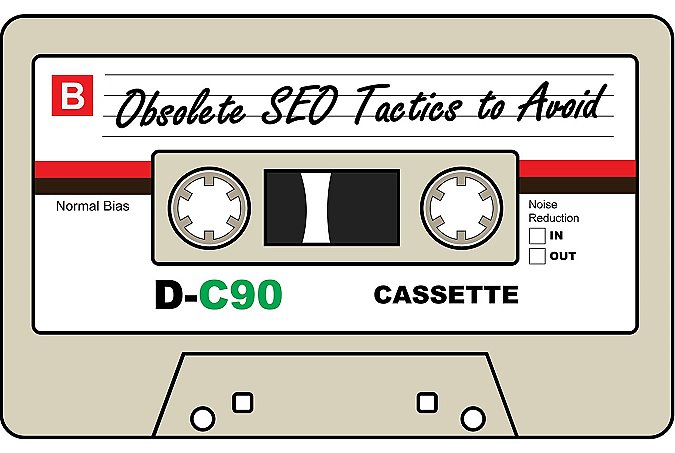
Search Engine Optimization Best Practices Have Changed
In the recent Ultimate Guide to SEO post, we talked about how Search Engine Optimization has changed and outlined what content creators should be working and focusing on, including E-A-T, ranking factors and the quality rater guidelines that Google gives their human reviewers to evaluate websites.
We included a section on obsolete SEO tactics to avoid. In this article, we’ll dive deeper to save you time and aggravation.
What Doesn’t Work in SEO

Obsolete SEO Tactics #1
Guest posting used to be an effective tactic for exposing your content to new audiences and gaining a keyword-rich external link, but it has fallen out of favor. Sites worth guest-posting on are hit up too many times and the site’s owners don’t even bother to respond to guest-posting requests. It’s a waste of your valuable time.
In August, John Mueller, the Webmaster Trends Analyst at Google said that links from guest blog posts have zero value in search.
There is still value in introducing your content to new audiences
He said on Twitter when asked about that as a link building strategy, he said “those links have zero value.” “It’s a waste of time if you’re just doing it for the links,” John added.
That said, if you get asked to write a guest post or an article in an offline publication, there can be benefits. Just don’t allow it to look spammy.
Writing articles for media properties like Entrepreneur.com and Huffington Post also used to be more effective than it is today. Everybody benefitted from a backlink from big authority sites and, while it may expose you to a new audience, the SEO benefits are not as juicy.
There was also a time when finding a broken link to a competitor on someone’s site and telling the owner that they had a broken link and asking them to link to similar content on your site worked well. It’s really a waste of time now. Much better to create awesome content that gets links.
All of these tactics seem a little spammy, don’t they? The work can be hard and the results meager.
'Guest blogging is probably the sort of thing that you should be thinking about doing in moderation.' Google’s former Director of Webspam Matt Cutts Share on X
Obsolete SEO Tactics #2
Linkbuilding is dead.
For the most part.
At one time, if you got a few websites pointing to you, you won the Internet. But a few things have changed:
- The Internet has gotten a LOT more competitive.
- There is a LOT more content.
- SEOs began abusing the tactic and Google caught on.

One of the most famous Google algorithms, Penguin, was designed to respond to spam results that were generating unnatural links. It’s been around for more than 8 years, yet people think gaining links, even from low quality sites or because they paid for them will help their results in search engines.
They won’t.
Moreover, the practice of repeatedly using the same keywords in anchor text linking to your pages draws a red flag. It’s better to mix in semantic keywords or even unrelated words, like, “Click here,” “previous article,” or “blog post” to make them more natural looking.
'The objective is not to 'make your links appear natural,' the objective is that your links ARE natural.' Matt Cutts Share on XLinks to your content ARE good. They just need to be legitimate. You get them by creating awesome unique content that people want to link to and share.
Obsolete SEO Tactics #3
Overusing keywords. There was a time when ‘keyword-stuffing’ help website ranking. Those days are long gone. Keyword stuffing can be very apparent to Google’s webcrawlers. When we, as visitors, come across pages that are abusing this technique, it’s also quite obvious. Again, it does not look natural.
So don’t do it!

What you CAN do, is use more related keywords, both in the article and in anchor text links to your article. We used to focus on one primary keyword per article, but now more comprehensive content works well.
Start with a keyword idea, like ‘blogging.’ See who is ranking for that broad term. Examine how much content there is and how it’s being presented.
Write down the headlines and sub-headlines. (You can use those to lay out your own content.)
You’re probably going to have a hard time ranking for such a short-tail keyword, but ranking for a few or even 100 long-tail keywords in one article can get you a TON of visitors.
So, expend your scope. Create related content based on suggestions using keyword tools OR by using the ‘Searches related to‘ plan.
Go into Google and enter your broad keyword, such as ‘blogging.’ Write down any related ideas you find on the first page of the SERPS. Many times, you’ll find the definition of your keyword. Good info, don’t you think?
I also found…
- How to start a blog.
- What is a blog used for?
- What is blogging and how does it work?
- How do I start blogging?
- How to start a blog in 2020?
- 17 Blogging Mistakes and How to Avoid Them
- Introduction to Blogging
- Blogging Tips
- Blogger Tips, Tools and Strategies
Then, down at the bottom of the page, Google supplies “Searches related to blogging.” And you see more ideas…
- blogging sites
- blogging platforms
- blogging meaning
- blogging for beginners
- blog examples
- create a blog
Do you see where this is going?
Build on the outline you created by examining the top pages for your broad keywords!

Obsolete SEO Tactics #4
Think beyond the PAGE. You can optimize a blog post about a focus keyword and a couple of dozen related or semantic keywords and maybe succeed. But we now know from Google’s Reviewer Guidelines, the instructions and questions it now has given its human reviewers, what is important.
Much of it, revolves around E-A-T. Expertise, Authority and Trust of not only the writer of the article but of the entire site, including multiple authors.
'If you have an outstanding product, world class content, or something else that sets you apart, then you can step back and think about how to promote it.' -Matt Cutts Share on XOne of the main questions is, “Are you an authority in your field?” Formal credentials or life experience. It can vary by niche and is expecially important in YMYL niches, ‘Your Money or Your Life.’ YMYL content is the type of information that, if presented inaccurately, untruthfully, or deceptively, could directly impact the reader’s health, safety, financial stability or happiness.
Many experts agree that it can take months for specific site content to rank on Google, especially for new sites. Too many people give up before then.
Many SEOs also agree that a blog needs a minimum of 50 or 60 articles before it gets much traffic from Google. Some argue that new sites should work on developing 100 or more articles of various lengths to begin moving the needle. Again, too many people give up before then.





